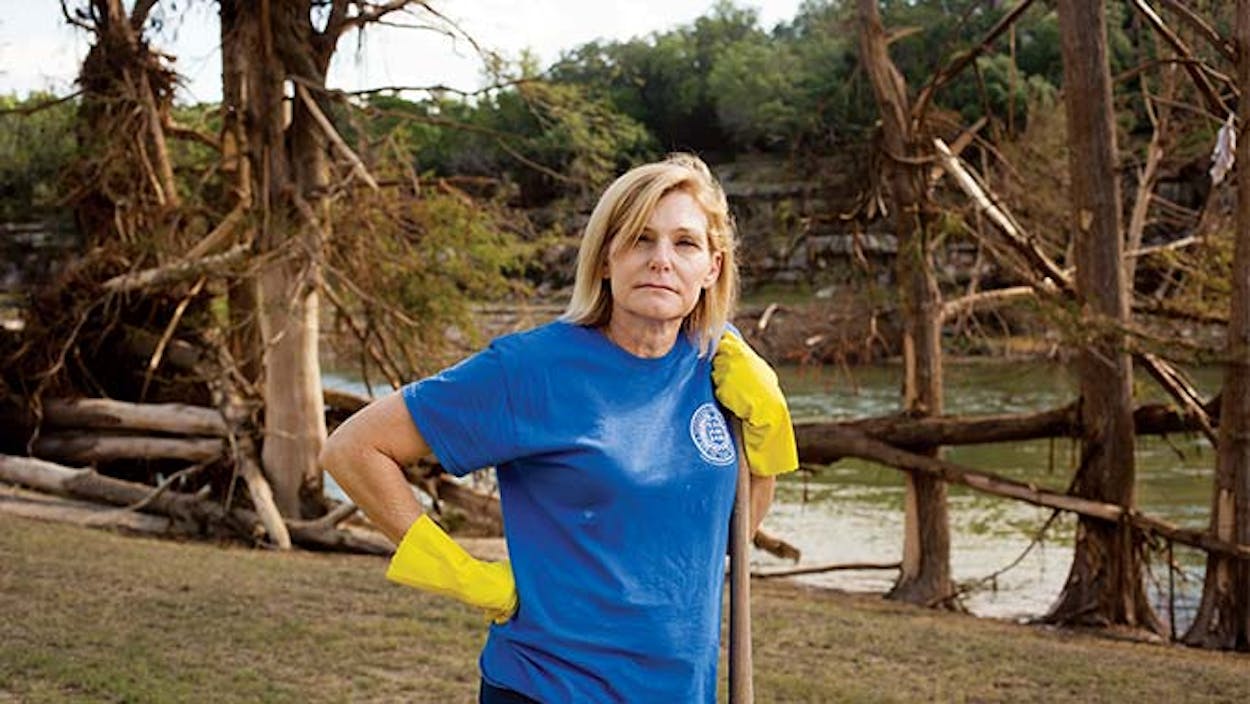A week after the Blanco River swelled into a raging flood, Diane Shofner shuffles through her ruined home to the back porch. There, with mud on her arm and a floppy Patagonia hat on her head, she looks out almost longingly at the river.
Somewhere beneath the Blanco’s current is a retaining wall she built by hand over the course of the decade she’s lived in Wimberley, evidence of this 57-year-old’s long and fond engagement with the river. Yet now the Blanco vexes her. And she’s dogged by the strangest sensation, she says: “Guilt.”
In the sterotypical narrative of natural disasters, there’s destruction and even death, then recovery, cleaning up, and moving on. But that’s not the way life actually unfolds in the wake of havoc. The people left behind are experiencing a different arc now: the adrenaline rush, the anxiety, the inevitable collapse. There is grief for the dead. And there is the oddly burdensome feeling of still being here after a brush with catastrophe.
Wimberley, population 2,600, is an impossibly idyllic village in the Hill Country that has always been defined by its clear, cool waters. Kids leap from rope swings over Blue Hole and jump from rocks into Jacob’s Well. Adults float the Blanco, trailing coolers of beer. Yet with little public access to the river, the town never devolved into the tourist-fueled mayhem of New Braunfels; it remained, instead, a quiet piece of paradise.
Until May 23, that is. That night, the TV buzzed with flash-flood warnings, and then the power went out in much of the town, plunging the valley into darkness. Shofner’s husband, Walter, trundled off to bed, but she stayed up with her sister, glimpsing the river’s rise in the flashes of lightning. Then it came: a massive white-capped wall of water.
That’s when she heard something she’ll never forget—a woman being swept away by the waters, screaming into the darkness. “That,” she says, looking away, “was the hardest part for me.” Minutes later, she and her family realized they were in peril too and escaped in Walter’s pickup truck.
As daylight arrived and the extent of the destruction became apparent—bridges destroyed or ripped apart, ancient cypresses snapped or stripped bare—much of the town seemed to stagger around in a state of disbelief. Then the police, the helicopters, and the National Guard came, and the business of relief got under way.
But most residents, spared the worst, can’t quite shake that feeling of guilt. A woman in the town library trying to post a Facebook message announcing the arrival of a tractor-trailer filled with food and dry goods is near tears worrying that people without Internet access won’t find out in time. A man in the post office, when asked how he fared, says simply, “Not as bad as others.”
People who experience survivor’s guilt don’t wish they had been victimized further, of course. They just feel that their good luck is somehow undeserved. Shofner knows she has nothing to feel guilty about; she has troubles of her own to deal with. The morning after the water hit, she returned to a ruined house. Now she’s resigned to the damage, the race against the mold already lost. “It’s going to be gross,” she says.
She turns back to the river, heartened that it’s dropping and clearing. But her gaze at her beloved Blanco is not the same. “We love our river,” she says. “But our river killed people.”







